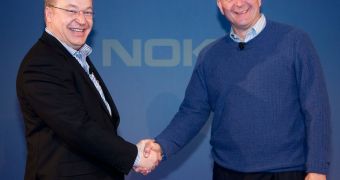The world is witnessing the birth of a new mobile superpower with Microsoft and Nokia joining forces.
Comparing the number of Windows Phone 7 devices sold in 2010 (some 2 million) with those featuring Android and iOS prompted me to say that WP7 was still a drop in the ocean of rival mobile platforms, Nokia included.
How things change in just a few days! In all fairness, speculation has been abundant of a mobile marriage between Microsoft and Nokia, and it seems that the rumors were more than true.
The two companies just announced a strategic partnership which involves Nokia adopting Windows Phone as its principal smartphone operating system. Of course, at the same time Windows Phone becomes the core element of the Nokia smartphone strategy.
“I am excited about this partnership with Nokia,” said Steven A. Ballmer, Microsoft Chief Executive Officer. “Ecosystems thrive when fueled by speed, innovation and scale. The partnership announced today provides incredible scale, vast expertise in hardware and software innovation and a proven ability to execute.”
Microsoft and Nokia make no secret from the fact that their partnership is designed to create a new global mobile ecosystem set up to disrupt those of Google Android and Apple iPhone.
“Today, the battle is moving from one of mobile devices to one of mobile ecosystems, and our strengths here are complementary,” said Ballmer and Stephen Elop, CEO, NOKIA (former President – Microsoft Business Division) in an open letter published today.
“Ecosystems thrive when they reach scale, when they are fueled by energy and innovation and when they provide benefits and value to each person or company who participates. This is what we are creating; this is our vision; this is the work we are driving from this day forward.”
While only 2 million Windows Phone 7 devices have been sold since the launch, expect this number to explode in 2011.
According to statistics released by market research company IDC, Nokia sold in excess of 100 million smartphones in 2010, and is still, by far the dominant smartphone manufacturer in the world today.
However, the one thing holding Nokia back was its mobile platform. Symbian was obsolete in many ways, and MeeGo, although in the making for quite some time, is still not here yet.
In addition, the application and services ecosystem for Symbian was quite weak, especially when compared to rivals Android and iOS (iPhone).
But this will all change now that Windows Phone will be the mobile OS for Nokia devices, and this is clear in the confidence expressed by Stephen and Steve in their open letter:
“There are other mobile ecosystems. We will disrupt them. There will be challenges. We will overcome them. Success requires speed. We will be swift. Together, we see the opportunity, and we have the will, the resources and the drive to succeed,” the two CEOs said. (emphasis added)
Per the strategic alliance between the duo, Nokia will play a role in driving the evolution of Windows Phone.
The collaboration also implies joint marketing initiatives and a shared development, and the integration of Nokia’s content and application store into the Microsoft Marketplace.
The Bing decision engine is going to power Nokia’s search for all Nokia devices and services, and Nokia Maps will become part of Microsoft’s mapping services, but will also be integrated into Bing and the adCenter platform.
Microsoft will take advantage of Nokia’s operator billing agreements to reach customers in markets where credit-cards use is not widespread, and will tailor its development tools to allow devs to build apps and services for Nokia Windows Phones.
“Together, we have some of the world’s most admired brands, including Windows, Office, Bing, Xbox Live, NAVTEQ and Nokia.
“We also have a shared understanding of what it takes to build and sustain a mobile ecosystem, which includes the entire experience from the device to the software to the applications, services and the marketplace,” the two CEOs stated.

 14 DAY TRIAL //
14 DAY TRIAL //